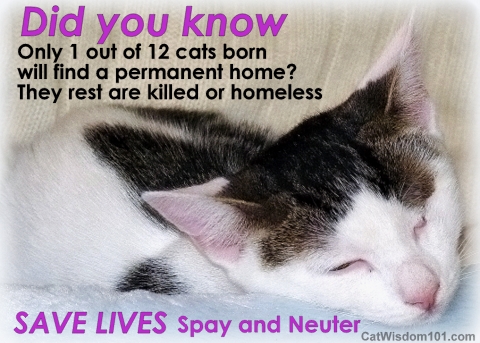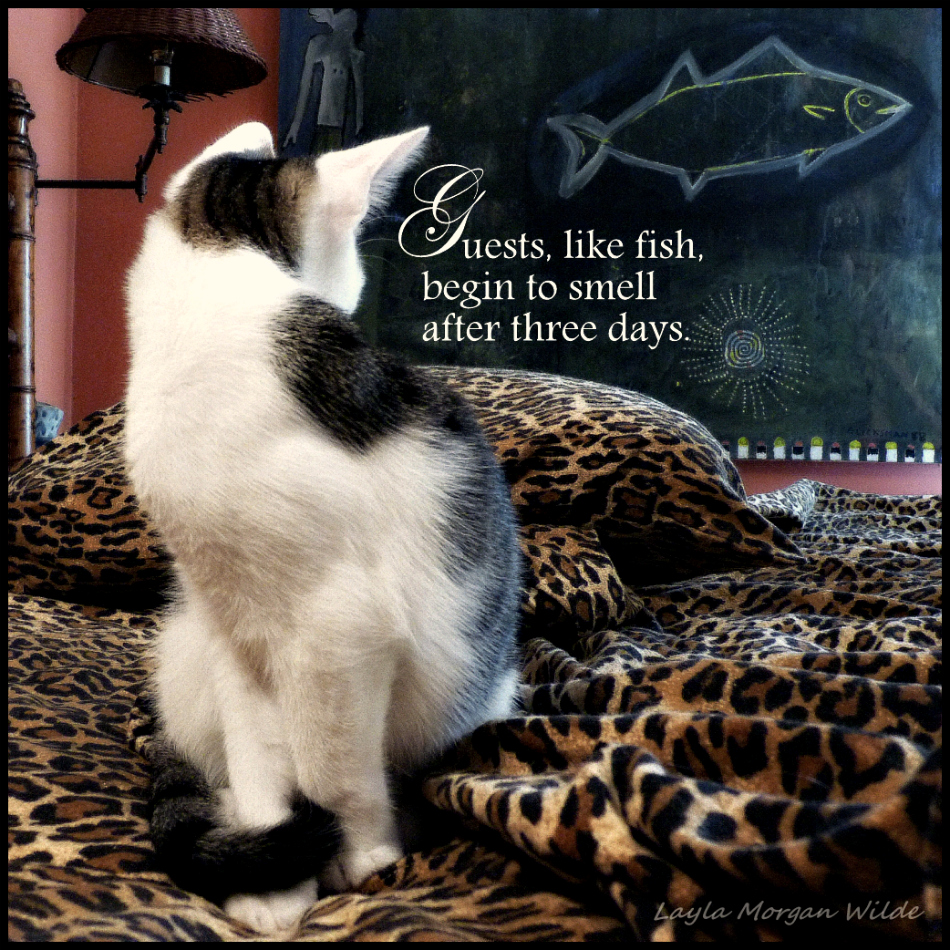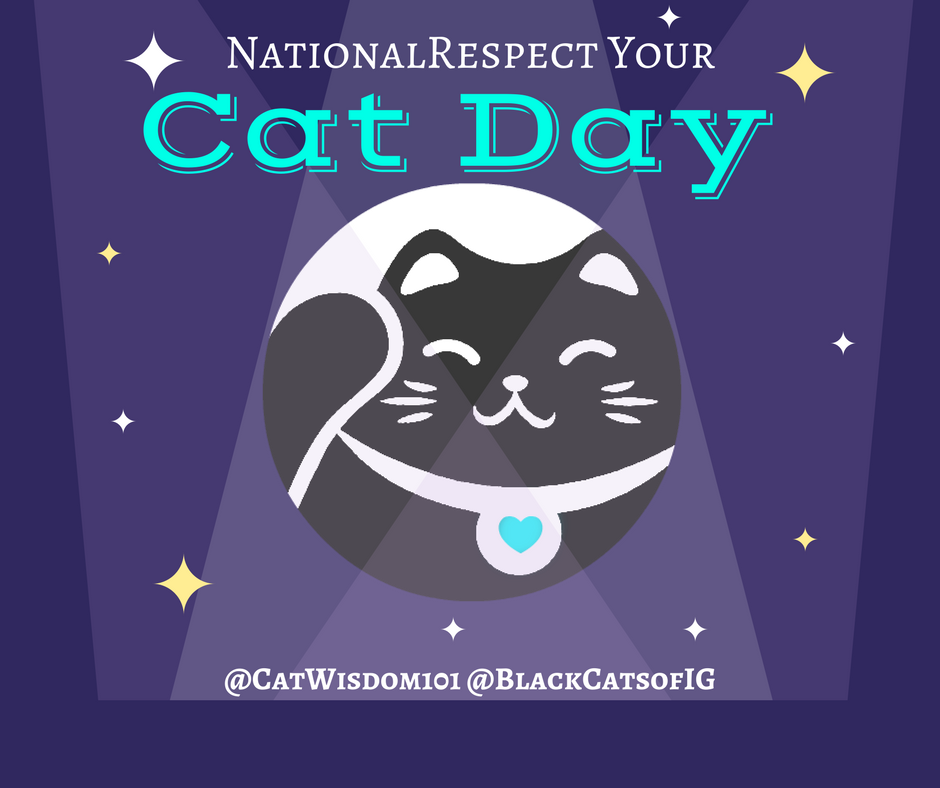Kitten Season Is Not Cute: Why Spay/Neuter Counts
Today’s Vet 101 guest post is by veterinarian and social media whiz Lorie Huston.

Why Should You Spay or Neuter Your Cat
by Lorie Huston DVM
Springtime is fast approaching and with it comes kitten season, that time of year when communitiesare overrun with litters of homeless kittens. The luckiest of these kittens find their way to shelters and rescues that ultimately will find homes for them. Unfortunately, not all of these kittens will be so lucky.
Reducing the number of homeless cats and kittens is one reason to spay or neuter your pet cat. And it’s a good one. Simply put, it’s what responsible cat owners do. However, reducing the feline overpopulation problem is not the only benefit to spaying or neutering your cat.
There are numerous health and behavioral benefits to spay/neuter.
- Female cats that are spayed, especially those that are spayed at an early age before their first heat cycle, have a significantly lower risk of mammary cancer than those cats that are not spayed. This is an important health benefit but it’s not the only one.
- When a female cat is spayed, her ovaries are both removed. Usually the uterus is also removed. This prevents your female from coming into heat. If you’ve ever lived with a cat that is heat, you already know it’s not a pleasant experience. Female cats vocalize, usually loudly and persistently, when they are in heat.
- Their behavior becomes erratic, often alternating between friendliness and irritability. Keeping your cat inside and away from any intact males (even those that are related to her) is essential when your cat is in heat. Otherwise, you’ll likely find your cat has gotten pregnant. For many cat owners, living through one heat cycle with their cat is enough to tip the scales in favor of spaying.
- Pyometra is a severe uterine infection that can prove to be life-threatening for unspayed cats. Cats develop this infection because of the changing hormone levels associated with coming in and out of heat. Spaying prevents this infection from occurring, another significant health benefit.
- A behavioral issue often found in unaltered cats is spraying. Both male and female cats can spray though it is more common in male cats. Cats spray to mark their territory and tell other cats to stay away. It is a form of inappropriate urination. By definition, spraying involves urinating on a vertical surface like a wall. However, some cats will also urinate on horizontal surfaces to mark territory. Although spaying or neutering will not stop this spraying behavior in all cats, the majority of altered cats do not spray.
- Neutered male cats tend to be less aggressive toward other cats and are likely to fight less than those that are not neutered. In addition, neutered male cats are more likely to be content to stay in your home or at least not wander as far from home in search of a female cat in heat if you do allow them outdoors.
Cats can reach sexual maturity by 6 months of age. Ideally, they should be spayed or neutered prior to this age. Kittens are routinely spayed and neutered as early as 6-8 weeks old, particularly in shelter and rescue situations. Early age spay/neuter allows kittens to be altered before leaving the shelter/rescue environment. However, if your cat is over 6 months of age, it’s not too late to spay or neuter. Cats of any age can be altered as long as they are healthy enough to undergo anesthesia.
Author bio:Lorie Huston is a veterinarian with over 20 years of experience working with dogs and cats. She currently practices in a busy urban setting. She is also a talented author, writer, blogger, and a Certified Veterinary Journalist (CVJ). You can find more about Huston at her pet health blog Pet Health Care Gazette. Her book Labrador Retrievers: How to Be Your Dog’s Best Friend is available on Amazon.




13 Comments
Skeeter and Izzy
Spay and Neuter…two words that we repeat again and again!
The older male that I did the TNR on in January is at least 5 years old and to the best of my knowledge has never had a home and it has made a HUGE difference in him. He is gaining weight,his coat is getting so nice and he is no longer expending all of his energy on fighting and looking for a female. He is staying much closer to “home” now. It also has the 100% prevention rate for testicular cancer in males! It is something that can never be repeated enough times. thank you Layla for saying it yet again. Luvs and purrs Skeeter and Izzy >^..^<
Layla Morgan Wilde
Thanks for the update. It’s good to hear about your feral. Remember Domino was about seven when he was neutered and is now a lap cat!
Bernadette
We can’t repeat this often enough–especially when nearly half of all the cats at TNR clinics are pregnant, some close to delivery.
Zee and Zoey - Deb Barnes
This subject is so important to me – thank you for such an informative and useful post, Lorie!
Abby
It saddens us to think that the numbers are so high.
🙁
Layla Morgan Wilde
This is such a painful reminder and reality check. It’s easier to post cute fun photos etc. but we believe in telling it like it is. There is choice and there can be change but it begins with humans.
Brian
Great info, and we wish kitten season would not be so darn active.
Katie and GLOGIRLY
The numbers are staggering.
We’re so lucky to have homes but our hearts break for those that never make it.
xo, Katie
da tabbies o trout towne
a sad post two day odin, but one that kneads ree peeted manee times….
🙁
Tamago
Kittens are very cute but homeless kittens make me feel sad 🙁
Katie and Coccolino
This time of year is always hard. There are kittens in abundance and I shudder to think of what happens to most of them.
Sparkle
I am not a fan of kitten season. It depresses me when I think of all the homeless cats and kittens at kill shelters.
Kathryn
Such good information!
Oh yes, years ago, we got a lovely 5 mo old brown tiger with beautiful green eyes from the Lakeshore Animal Hospital in Chicago. She’d been rescued from Phisohex testing. The hospital made us promise not to spay her. As I said, it was years and years and years ago. After six months of her being in heat – she was about 15 months old, we had to spay her. That constant caterwauling all night.
Our two boys are 11 and they were both altered at the shelter before they were 5 months old. They are two very happy bros.